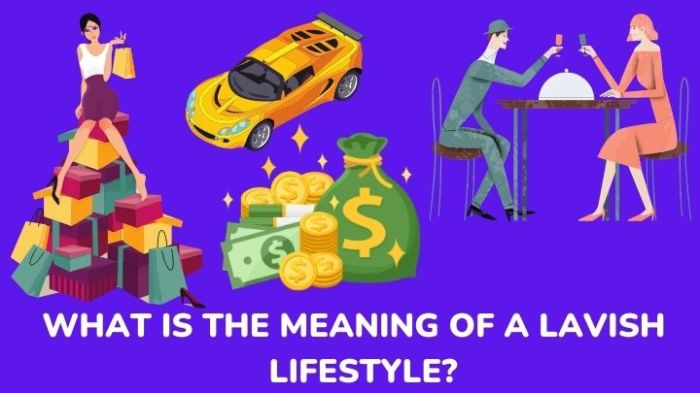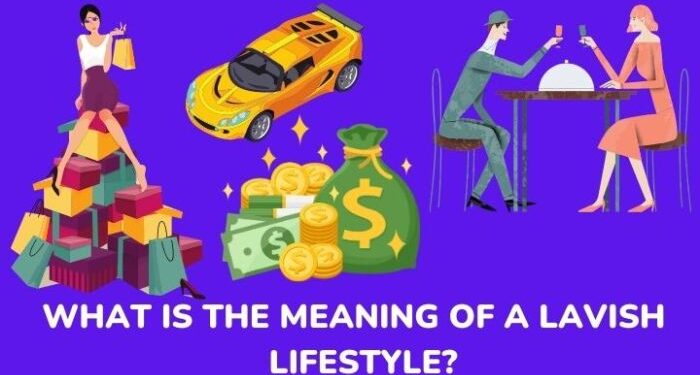Exploring the intricate relationship between lavish living and status choices, this introduction delves into the impact of social media and psychological factors on individuals' desire for luxury. From the role of influencers to societal pressures, this topic uncovers the complex motivations behind our pursuit of status symbols.
As we navigate through the various aspects of this phenomenon, we will gain insight into how childhood experiences and societal expectations play a crucial role in shaping our attitudes towards material possessions. Through a psychological lens, we will uncover the underlying reasons why individuals are drawn to ostentatious lifestyles and how these choices reflect deeper emotional needs.
The Influence of Social Media on Status Choices
Social media platforms play a significant role in shaping individuals' perceptions of lavish living and influencing their status choices. The curated images and lifestyles portrayed on platforms like Instagram and TikTok can create a desire for luxury goods and experiences.
Role of Influencers in Promoting Status Symbols
Influencers on social media platforms often showcase luxurious items such as designer clothing, high-end cars, and exotic vacations. Their endorsement of these status symbols can create a sense of aspiration and desirability among their followers, leading to an increased desire for similar products.
Impact of Social Media on Desire for Luxury Goods
The constant exposure to glamorous lifestyles and material possessions on social media can fuel the desire for luxury goods. Seeing others showcase their expensive belongings can create a sense of FOMO (fear of missing out) and drive individuals to seek similar items to enhance their own social status.
Psychological Motivations Behind Lavish Living
Living a lavish lifestyle is often driven by deep-seated psychological motivations that go beyond mere material possessions. Individuals are drawn to extravagant displays of wealth and status for a variety of reasons, rooted in their emotional needs and desires.
Conspicuous Consumption
Conspicuous consumption is a term coined by economist Thorstein Veblen to describe the practice of spending money on luxury items and services to publicly display one's social status. This behavior is driven by the desire to signal one's wealth and success to others, often in an attempt to gain recognition, admiration, and respect.
By flaunting expensive possessions, individuals seek validation and acceptance from their peers, as well as a sense of superiority and prestige.
- Conspicuous consumption serves as a means of self-expression, allowing individuals to communicate their identity, values, and aspirations through material possessions.
- It can also act as a coping mechanism for feelings of insecurity or inadequacy, providing a temporary boost to self-esteem and confidence.
- Furthermore, the pursuit of luxury goods and experiences is often fueled by a desire for social comparison and competition, as individuals strive to outshine others in terms of wealth and status.
Societal Pressures and Status Symbols

Societal expectations play a significant role in influencing people's choices when it comes to displaying their status. The pressure to conform to certain standards of living can be overwhelming, leading individuals to make decisions based on what is deemed acceptable or prestigious in their social circles.
This pressure can stem from a desire to fit in, gain approval, or be seen in a certain light by others. Additionally, the connection between social status and self-worth can be deeply intertwined, as individuals may equate their value and significance with the material possessions and lifestyle they portray.
Impact of Societal Expectations
- Social norms dictate what is considered 'normal' or 'successful' in society, influencing individuals to strive for a certain level of status.
- Media portrayal of lavish lifestyles and celebrities can create unrealistic expectations and fuel desires for material possessions as status symbols.
- Peer pressure within social circles can push individuals to keep up with the latest trends and maintain a certain image to avoid judgment or exclusion.
Connection between Social Status and Self-Worth
- Individuals may feel a sense of validation and worthiness when they are able to display symbols of wealth and success, as it can boost their self-esteem.
- Comparing oneself to others based on material possessions can lead to feelings of inadequacy or inferiority if one perceives themselves as lacking in status.
- Social status can become a measure of personal achievement and value, shaping how individuals view themselves and their place in society.
The Role of Childhood Experiences in Status Choices
Childhood experiences play a crucial role in shaping individuals' attitudes towards material possessions and their pursuit of status symbols in adulthood. These early life experiences can have a lasting impact on how people perceive luxury items and the importance they place on external symbols of success.
Influence of Childhood Socioeconomic Status
Growing up in different socioeconomic environments can significantly influence adult preferences for luxury items. Children from affluent families may be accustomed to a lavish lifestyle and expensive possessions, leading them to seek similar status symbols in their adult lives. On the other hand, individuals from lower socioeconomic backgrounds may develop a desire for luxury items as a way to elevate their social status and distance themselves from past financial struggles.
Link Between Childhood Trauma and Pursuit of Status Symbols
Childhood trauma, such as abuse, neglect, or instability, can also impact an individual's pursuit of status symbols. Some people may use material possessions as a coping mechanism to fill emotional voids or compensate for past hardships. The need for external validation through luxury items may stem from a lack of emotional support or a sense of insecurity developed during childhood.
Epilogue

In conclusion, the discussion on The Psychology Behind Lavish Living and Status Choices sheds light on the intricate interplay between social influences, personal motivations, and societal pressures. By understanding the underlying psychological mechanisms driving our pursuit of status symbols, we can gain a deeper appreciation for the complexities of human behavior and the quest for social validation.
Essential FAQs
How does social media influence our perceptions of lavish living?
Social media platforms create a curated image of luxurious lifestyles, leading individuals to aspire to similar standards of living.
What is conspicuous consumption and how does it relate to status symbols?
Conspicuous consumption is the act of purchasing goods to display wealth or status. It is often associated with the acquisition of luxury items as symbols of social standing.
How do childhood experiences impact our preferences for luxury items in adulthood?
Early life experiences, especially childhood socioeconomic status, can influence adult preferences for luxury goods as a way to compensate for perceived deficiencies.
Is there a correlation between childhood trauma and the pursuit of status symbols?
Some individuals may seek out status symbols as a coping mechanism for unresolved childhood trauma, using material possessions to validate their self-worth.










